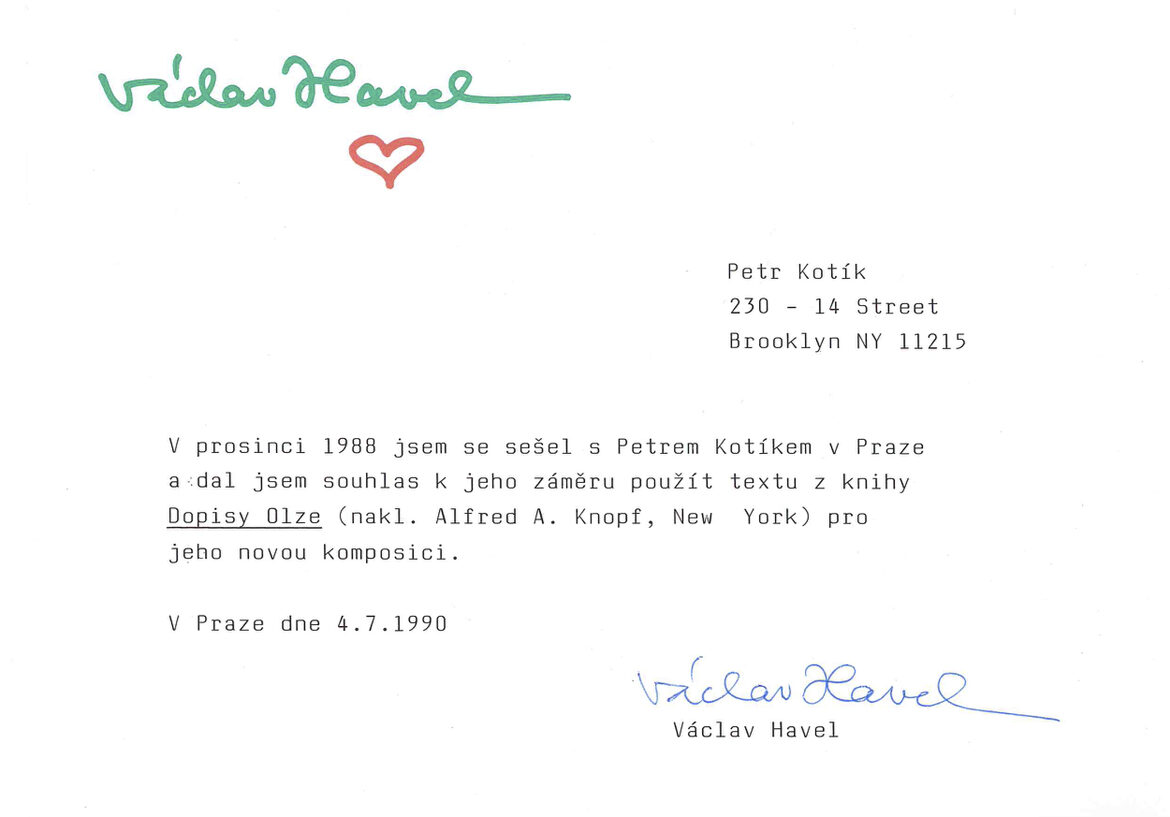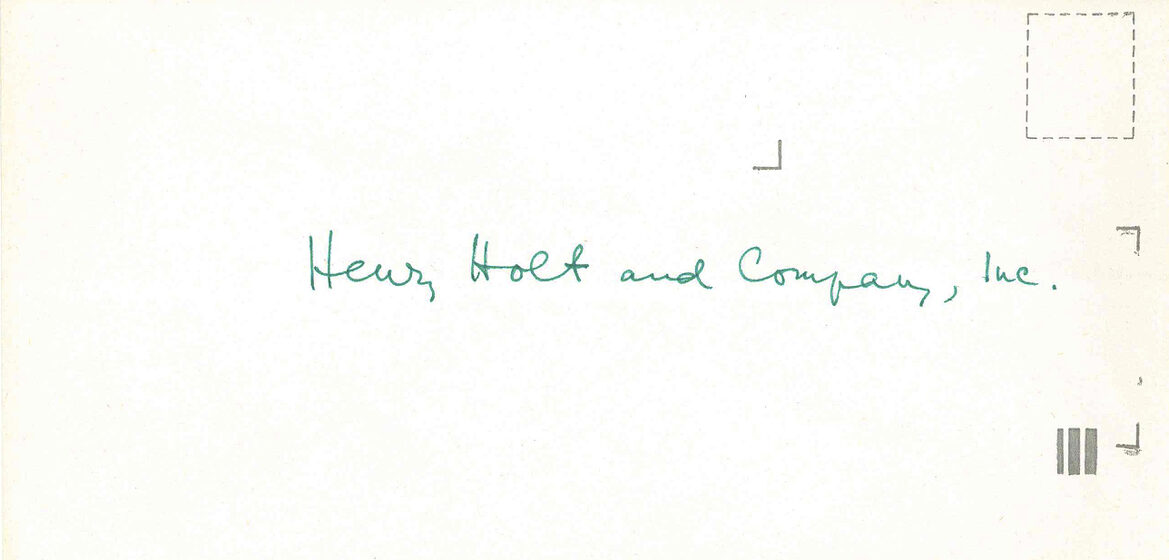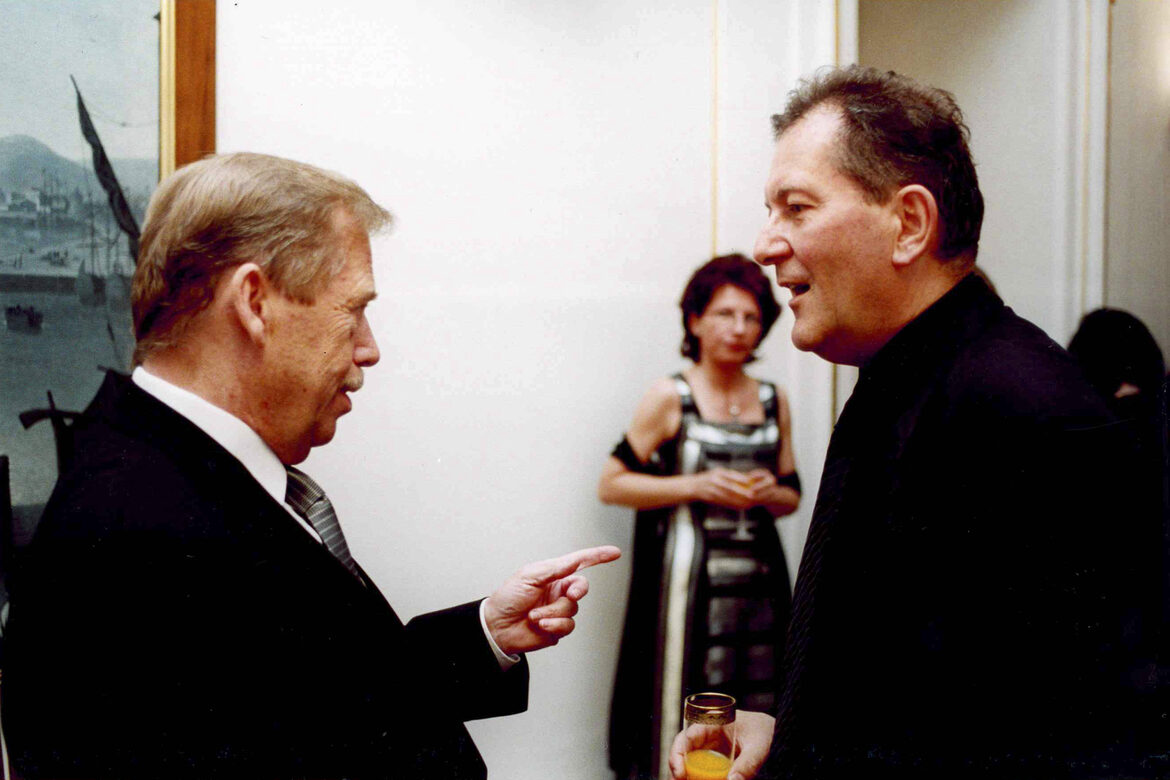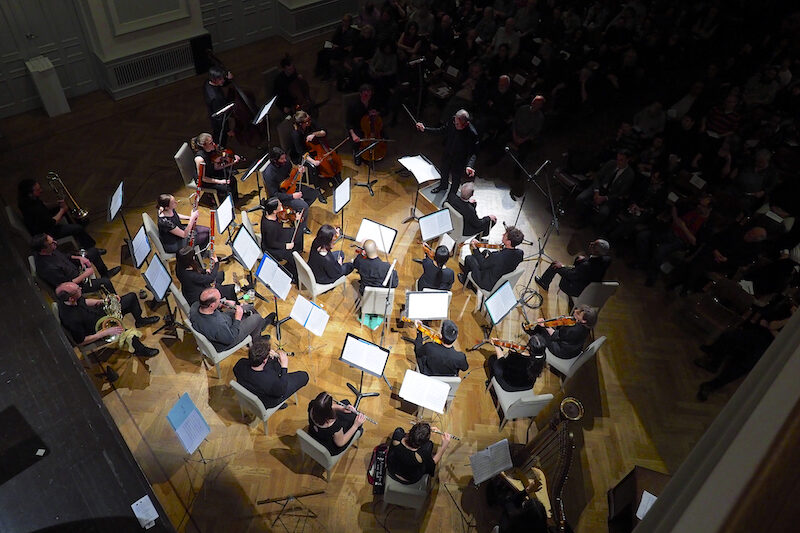Petr Kotik on “Letters to Olga” and Václav Havel
In the Summer of 1988, I started to work on a new piece, using excerpts from articles published in the New York Times. There was an extreme heat wave and droughts in the Midwest. The newspapers were full of bizarre stories, not only about the weather, but also about the presidential election campaign; some of these stories bordered on the absurd. The piece I started was to be a collage of text and music, from small fragments to large excerpts. As I composed, I began to have doubts about the newspaper texts. Just as I was about to abandon the project, I came across “Letters to Olga” by Václav Havel, which had just been published in English. When I opened the book and glanced at the writing, I knew that I had found the right text for my piece. Havel’s letters to his wife Olga were written from 1979 to 1982, while serving jail time for his political activities. The letters cover a broad range of topics (like the newspaper texts had), from the philosophical to the practical, from descriptions of jail to observations about other inmates – some of them his friends and co-defendants.
Around this time, I had been going back to Prague frequently, to visit family and to perform in various settings. These performances were arranged by friends of mine who were all participating in or connected to dissent from the politics of the government.
My visit at the end of 1988 was unusually colorful. Our whole family (Charlotta, Tom, Jan and myself) ended up in Prague with the family of Paula Cooper and her husband Jack Macrae. Jack, who was in charge of Henry Holt & Co, was preparing to publish a paperback edition of Havel’s “Letters to Olga.” For this edition, Jack wanted to have an introduction by Havel.

Havel giving his permission for me to use his text in my piece.
Václav Havel and I had known each other well since the mid-1960s, and I was planning to see him, to tell him about my plans to use his “Letters to Olga” for my next piece. As it was around Christmas, and all of us had plenty of time (this seems almost unreal in our present rat-race situation). I recall meeting often with Havel during these few weeks in Prague, with Paula and Jack joining us on a few occasions. Havel agreed to write the introduction for the paperback edition of “Letters to Olga,” and would give me the text later. On January 2, 1989, I gave a solo concert as part of a lecture series by the dissident philosopher Petr Rezek. My concert was announced as another lecture under the title “A Whistle from Brooklyn” [Brooklynská píšťalka], as at that time, concerts were only allowed as productions of the state concert agency. Havel agreed to come to the concert and give me the typed text. He showed up during the intermission and gave me, in the open, the envelope with his text. Contrary to my expectation of being searched by the secret police, nothing happened and I brought Havel’s introduction safely to New York.

The envelope Havel handed to me at intermission.
A seven-minute excerpt of Letters to Olga was first performed in April 1989 at the Witten Festival. It was a commission by the festival called "3x7," given to a number of composers to commemorate the tenure of the festival’s founder, Wilfried Brennecke, who was retiring after twenty-one years. All of the commissioned pieces were to be between 3 and 7 minutes long, and for 3 to 7 musicians (among the composers receiving the commission was John Cage, who composed “Five,” which the S.E.M. Ensemble premiered at the festival). Letters to Olga is dedicated to Wilfried Brennecke. The first complete performance (50 minutes long) was on December 19, 1989 at the Paula Cooper Gallery in New York.
When I met with Havel around Christmas time of 1988, it was almost a year before the fall of the communist regime and Havel’s ascendency to the post of president of Czechoslovakia. During my stay, I made a short trip to Vienna. When I returned, we met again, and he asked what I had been up to since our meeting the previous week. I told him about my three-day visit to Vienna. He looked at me with melancholy – since 1968, he had not been allowed to cross the border. Then he said, "twenty years ago I was also able to go to Vienna, just for a short trip like that. Since then, I have not been allowed to travel at all." At this moment, I felt profoundly embarrassed, ashamed of my "privileges." Being able to travel freely seemed, at this moment, almost an embarrassment. I am glad that such situations are a matter of the past (or are they?).

Václav Havel and Petr Kotik in 2001
On Letters
There is something peculiar about the form of letter writing, at least of those that attempt to go beyond communicating private matters. For example, the memoir of Stalin’s daughter Svetlana Alliluyeva takes the form of “Twenty Letters to a Friend.” Then there are Václav Havel’s letters from prison to his wife Olga. As Havel mentions in the introduction to the publication, “Writing these letters… made me feel I was doing something worthwhile and that my years in prison were not completely wasted.”
Here are a few quotes from “Letters to Olga” which are used in the performance:
“…a world with no firm center, no fixed identity, no past and no future, with no coherence or order, a world where all certainties are disintegrating and where, suspended above this disintegration like a melancholy mist, there hangs the memory of different world, where things were themselves.”
“Art in general is a little like playing with fire; the artist deals with something without knowing precisely what it will "mean." The work, it seems to me, should always be somehow "wiser" than its author.”
“I had an unarticulated feeling that there was some carefully concealed conspiracy against me and what was more, I felt it was justified…why should I, of all people, have more than anyone else? Children are surprisingly perceptive and sensitive to such things, without of course understanding them or being able to express them… It may seem paradoxical, but I think that because of those early experiences I have always had a heightened sensitivity and aversion to… inequality, and privilege in general. The second significant circumstance was the fact that I was fat. It is well known that a community of children, whose behavior is somehow closer to nature and therefore guided more by primitive instincts than moral awareness, has a tendency - like some animal packs - to exclude individuals who are less physically fit or otherwise handicapped in some way…”
[observation on the way to the prison] “Various oversized factory yards, full of litter, filth and unused areas, muddy access roads leading God knows where, garages, warehouses, stockpiles of abandoned construction material and other things. Unsightly byways, chaos and squalor, garbage and refuse everywhere, areas with no visible purpose or logic.”
“I am certainly not a proper Christian and Catholic… I do not worship this God of mine and I don't see why I should. What he is - a horizon without which nothing would have meaning and without which I would not, in fact, exist - he is by virtue of his essence, and not thanks to some strong-arm tactics that command respect… he is a master of waiting, and in doing so he frequently unnerves me. It is as though he set up various possibilities around me and then waited silently to see what I would do. If I fail, he punishes me, and of course he uses me as the agent for that punishment.”
